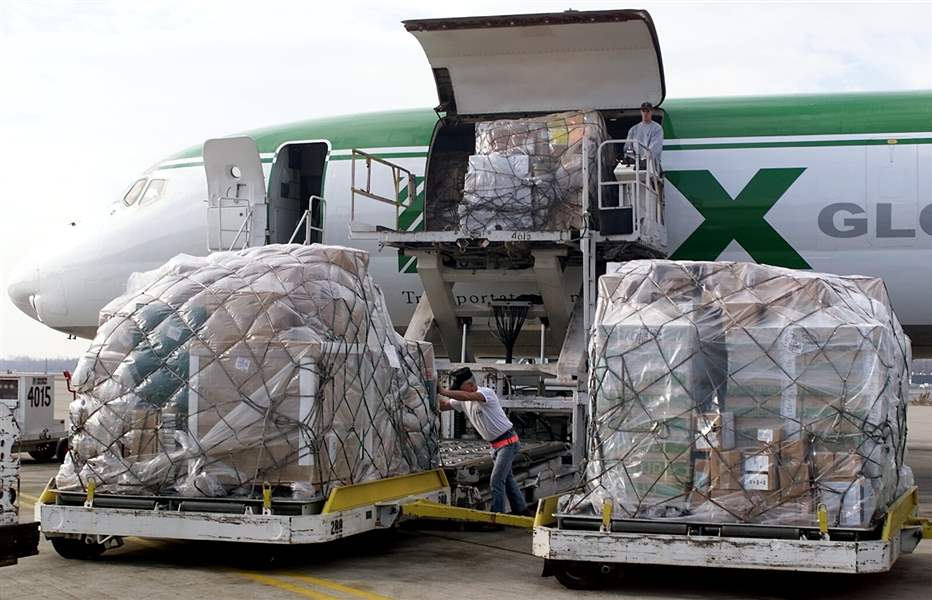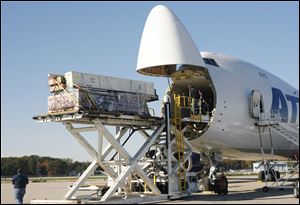
TOLEDO EXPRESS AIRPORT
BAX Global to close, end 700 local jobs
Air freight company cites changes in its industry
7/23/2011
BAX Global’s daily domestic flights in Toledo numbered 44 in the late 1990s but fell steeply, an executive said.
THE BLADE

BAX Global’s daily domestic flights in Toledo numbered 44 in the late 1990s but fell steeply, an executive said.
A monumental shift in customers shipping freight by ground transportation instead of by air led to an eye-popping announcement Friday that BAX Global Inc. would shutter its U.S. air hub at Toledo Express Airport on Sept. 1, eliminating 700 jobs.
The news, coming about six months after the freight carrier postponed a planned investment in a facility upgrade, caught some local political leaders by surprise, including Toledo Mayor Mike Bell.
But the move is in line with a shrinking air-freight industry, which has hit Ohio especially hard. DHL decided in 2008 to close its distribution hub in Wilmington, cutting 7,000 jobs. United Parcel Service Inc. closed its freight hub in Dayton in 2006, eliminating 1,400 jobs.
BAX — then known as Burlington Air Express — opened its Toledo hub 20 years ago, amid high expectations for business. The company’s Toledo operation had fallen to 19 domestic flights per day, less than half its 44-departure peak in the late 1990s, one company executive said.
Chris Ferrell, an associate director for Tompkins Supply Chain Consortium, authored a study last month that showed air freight’s share of the logistics industry has fallen from 14 percent to 5 percent — a decline of nearly two thirds — since 2009. Other means of moving goods from one place to another have gained, he found.
“The thing that we’ve seen consistently since 2008, when everybody had to take a long, hard look at every single dime being spent, when they looked at [the cost of air cargo], they converted … in droves,” he said.
BAX Global, a division of German transportation giant DB Schenker, said its move at Toledo, and its plan to shed its fleet of leased planes, were part of a “strategic realignment” of its North American business model. Most jobs to be eliminated are part time.
Heiner Murmann, chief executive officer of Schenker, said in a statement: “We deeply regret that there will be some layoffs as part of this realignment. However, we are working to redeploy as many employees as possible to other parts of our business.”
The company said the phasing out of the U.S.-dedicated air fleet, which represents less than 10 percent of the company’s business in North and South America, will take place over the next several weeks, and “is in response to changing marketplace conditions and along with the renewed focus on transportation management services is aimed at positioning the company for continued growth and success.”
In a statement, Paul Toth, director of the Toledo-Lucas County Port Authority, which operates Toledo Express, said the agency was “incredibly disappointed to learn that our partner for more than 20 years... will be phasing out of its U.S.-dedicated air fleet” and moving to ground transportation.
Mr. Toth said, “Toledo Express has a strong background in the global cargo market, and it is the desire of the Toledo-Lucas County Port Authority to continue cargo operations absent of BAX Global. The Port Authority continues to actively pursue various activities and opportunities relative to cargo development at Toledo Express.”
However, there is no indication of firm prospects to succeed BAX Global at Toledo Express.
The port authority’s lease agreement with BAX Global, which was guaranteed by DB Schenker, is effective through September, 2013. Mr. Toth said the agency would “determine the impact this will have on port authority operations” in the coming weeks.
“It’s very regrettable, but it was necessary,” Jay Arnold, senior vice president of human resources for the Americas for DB Schenker, told The Blade. “The operating model has shifted from air to ground transportation solutions.”
He added: “We tried other avenues [to keep Toledo open]; we reduced the number of planes that fly. We’re going to do everything in our power to help as many of our employees as possible find employment at our other locations.”
DB Schenker has about 90 locations across the United States, including logistics facilities in Cleveland, Dayton, Columbus, and Detroit. Mr. Arnold said the company is offering its employees a severance package if they remain on the job through the Sept. 1 closure “to help them if they don’t move on.”
The hub has been in place at Toledo Express Airport since 1991, when the company moved from Fort Wayne, Ind., and was known as Burlington Air Express. When it opened on Sept. 4, 1991, the 279,000-square-foot hub had 800 jobs locally, served customers in 130 cities across the United States, and could sort up to 1.4 million pounds of cargo per shift. At the time, the company signed a 23-year lease agreement with the Toledo-Lucas County Port Authority that was used to repay a $30.8 million bond issue used to build the facility.
Representatives of the port authority said they have been trying for months to keep BAX Global at Toledo Express but were finally done in by the bad economy.
The port authority more than two years ago had secured $6.2 million in state and federal grants to pay most of the cost to build a customs facility and truck terminal at the hub and relocate the hub’s maintenance operations.

A recent study shows air freight’s portion of the logistics business has declined from 14 percent to 5 percent since 2009. Ohio has seen the closing of two other major hubs.
“We knew they were re-evaluating their U.S. business model,” the port president said. “We expected they would sit down and discuss it with us,” but instead informed the port authority about the pull-out in a wee-hours phone call.
Rob Nichols, a spokesman for Gov. John Kasich, said, “From the day we took office, we have reached out to them to see what resources they need. Our efforts were frustratingly rebuffed. We’re extremely disappointed. We hope they’ll reverse their decision. We’re not giving up on them yet. If not, we hope they’ll put another operation on that site.”
U.S. Rep. Marcy Kaptur (D., Toledo) said she spoke personally to Mr. Murmann to see what might be done to save the facility and its jobs, but was told rising fuel prices and the economy had forced the company’s hand.
“It was a very cordial conversation, one where we tried to leave the door open for the community if they wanted to consider another facility there,” Miss Kaptur said.
Mayor Mike Bell, who said he had heard speculation about BAX Global closing, said the news was “disappointing for Toledo and for North America.”
In 1997, as a subsidiary of Pittston Co., Burlington Air Express changed its name to BAX Global Inc. The company was purchased for $1.2 billion in 2005 by Deutsche Bahn, Germany’s largest rail operator, and its Schenker logistics affiliate.
Blade staff writers David Patch, Sheena Harrison, and Ignazio Messina contributed to this report.
Contact Larry P. Vellequette at: lvellequette@theblade.com or 419-724-6091.